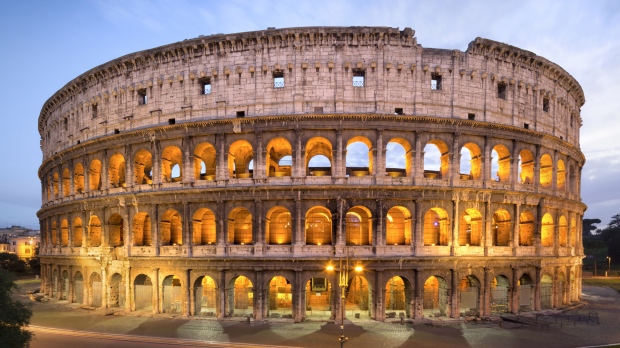CLAS 357
Autocracy (Nero)
March 25, 2024

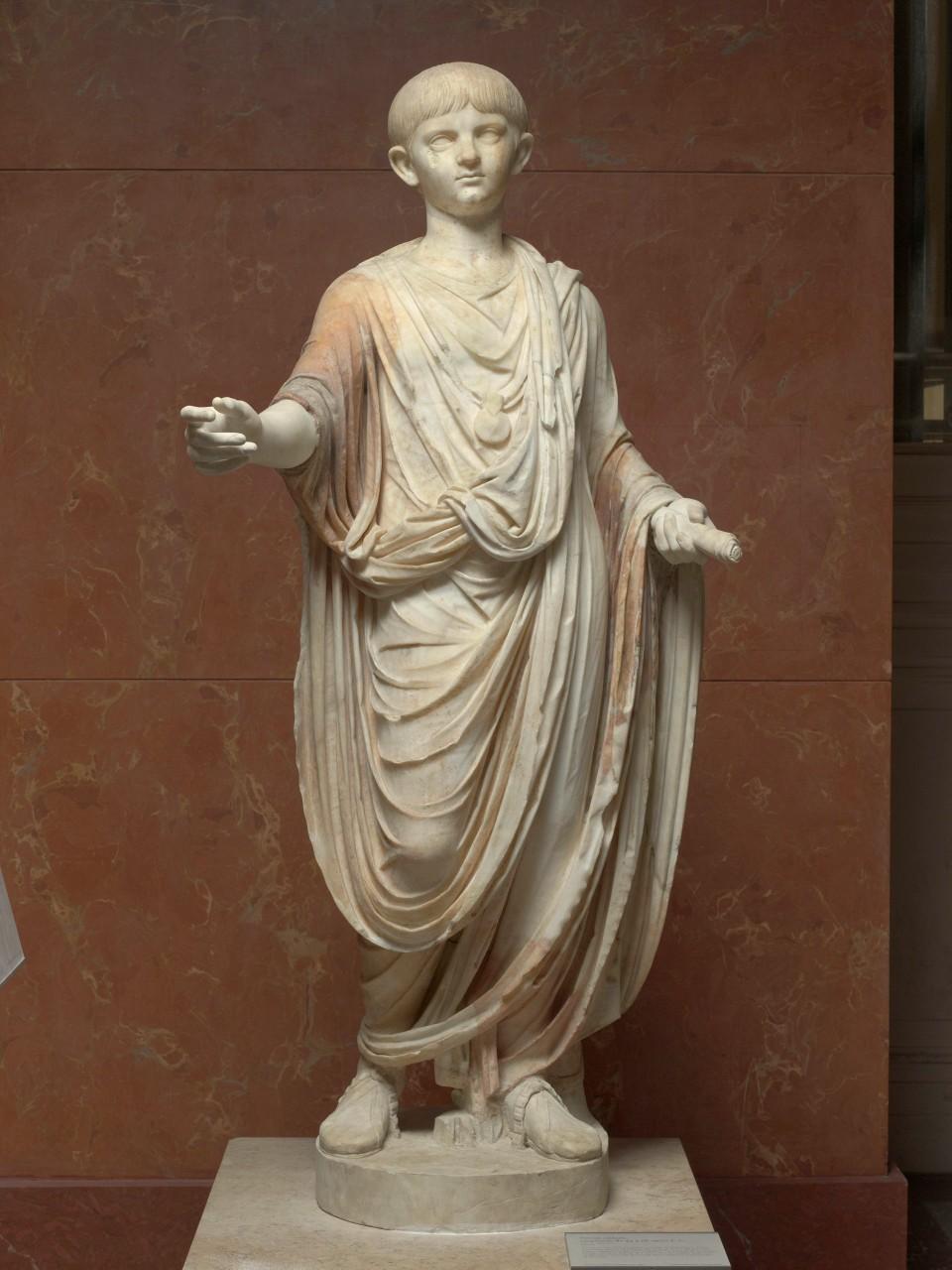
Nero, born 37 CE; emperor 54-68 CE (R: marble of young Nero, 50-54 CE)
Study Guide for Examination #2 (Wednesday, March 27)
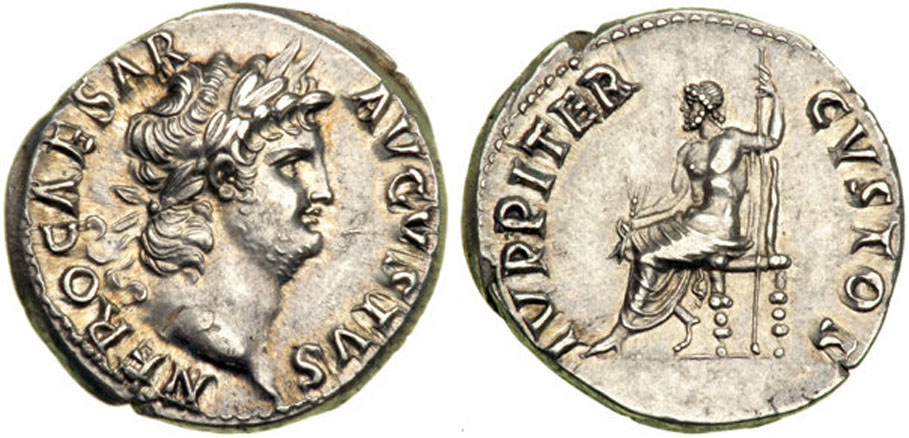
Coins of 64-65 CE: L: Nero Caesar Augustus; R: Juppiter Custos ("Jupiter Guardian")
artist's hyper-realistic portrait head of Nero based on Suetonius's description (Ahenobarbus, "red-bronze beard", and Nero's subflavus, "somewhat orange-ish" hair, Nero 51)
- Nero's personal characteristics (vis-à-vis Caligula's): shares viciousness (e.g. wild animal game, 29); abuse of power (paranoia: e.g. executes stepson "said to play at being general and emperor", 35); disruption of traditional sexual boundaries (e.g. Sporus "treated as wife", 28); jealousy, financial corruption & extravagance (emperor's cut of wills, "You know what I need", "The object of the exercise is to leave no one with anything", 32); displays of wealth (e.g. fishing with a net of gold, 30); cowardice (prolonged death/suicide, taunt of guards "Is it really so hard to die?", 47-49); narcissism
- Nero's distinct behaviors: theatrical/public performances (theater, music, singing, chariot racing) + elaborate social performances (e.g. fake triumph for Olympic "victories" in Augustus' chariot to Temple of Apollo, 25)
Suetonius, Nero 26 (nighttime roleplay in taverns & streets)
As soon as night had fallen, he would throw on a freedman's cap or a wig and would go around the cook-shops and wander about the streets looking for amusement—though putting himself at some risk, for he was in the habit of setting upon people returning home from dinner and would hurt anyone who fought back, throwing them into the drains, and he would even storm into the taverns and pillage them, setting up a market in his palace, where the spoils he had acquired were divided up for auction and he squandered the proceeds. And often in the course of these brawls, he would endanger his eyes or even his life.
Nero's Imperial History
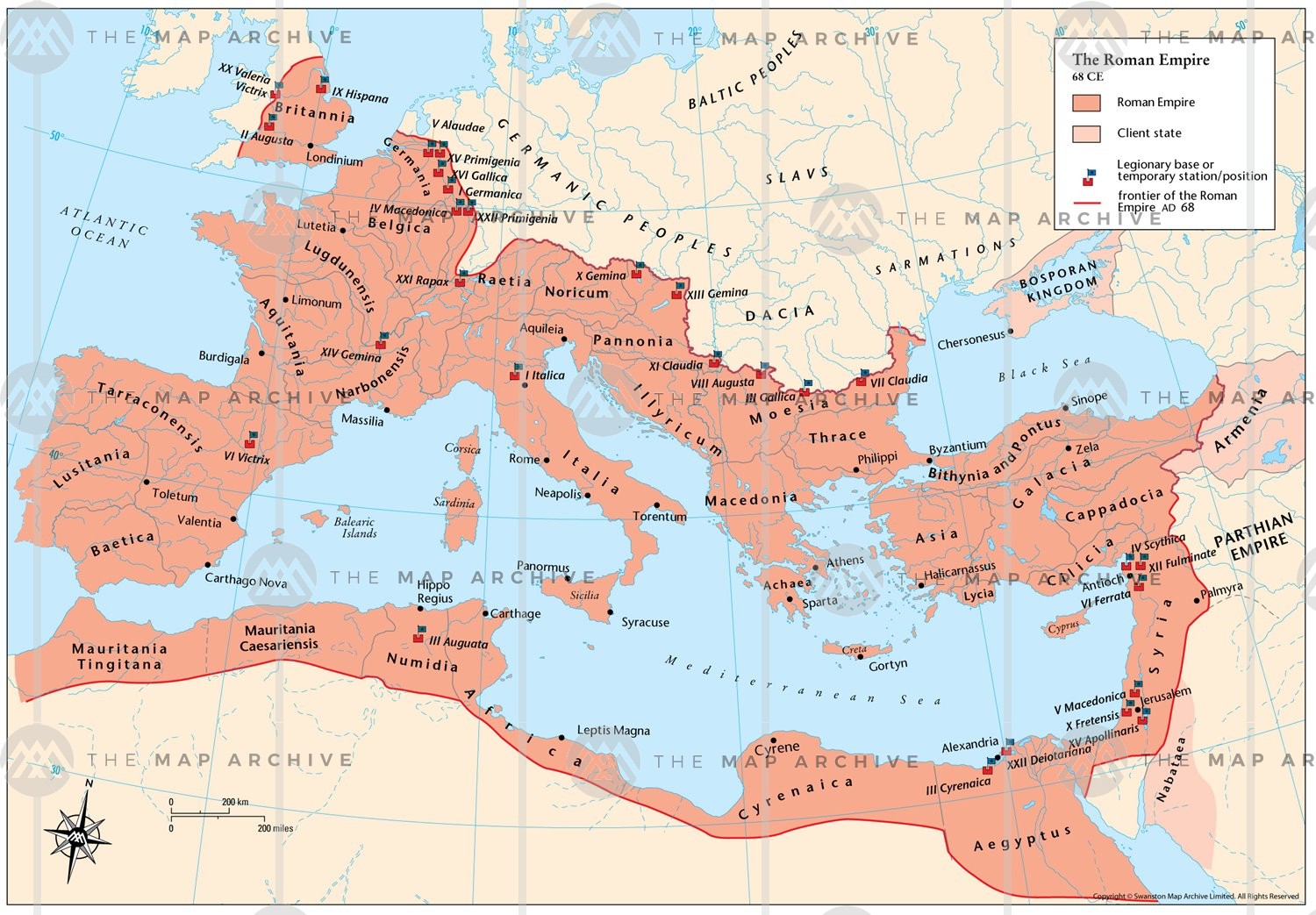
Roman Empire at the Time of Nero's Death (68 CE)
Suetonius' biography: 1-7 (family background); 8-19 (early reign); 20-50 ("shameful deeds and crimes"); 51-57 (summary & death); senatorial & Flavian bias (sources: Suetonius, Tacitus, Cassius Dio)
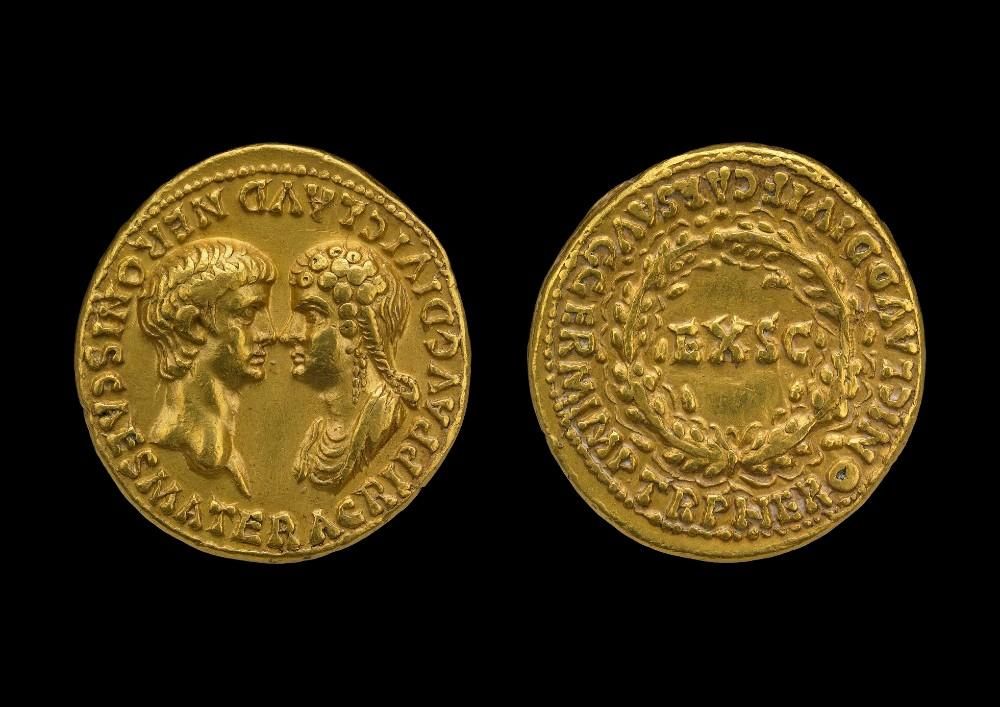
Nero and Agrippina (aureus, 54 CE)
- Nero Claudius Caesar Augustus Germanicus (adopted name), born Lucius Domitius Ahenobarbus (37-68 CE): son of Domitius & Agrippina the Younger (Caligula's sister – exiled by Caligula, later marries emperor Claudius); adopted by great-uncle Claudius (emp. 41-54 CE), great-great grandson of Augustus
- early reign (quinquennium, "5 years"): guided by Seneca (philosopher/advisor) & Burrus (Praetorian Prefect); "new Augustus" (displays of generosity, clemency, transparency of rule, stay of executions, games with lavish gifts, etc.) & populism ("Above all, however, he was moved by a passion for popularity and was envious of anyone who in any way inspired the enthusiasm of the common people", 53); interest in performances surfaces early (circuses, theater, music, 10-12)
Seneca: On the Creation of Earthquakes (dir. Robert Schwentke, 2023)
trailer ; clip from Berlin film festival
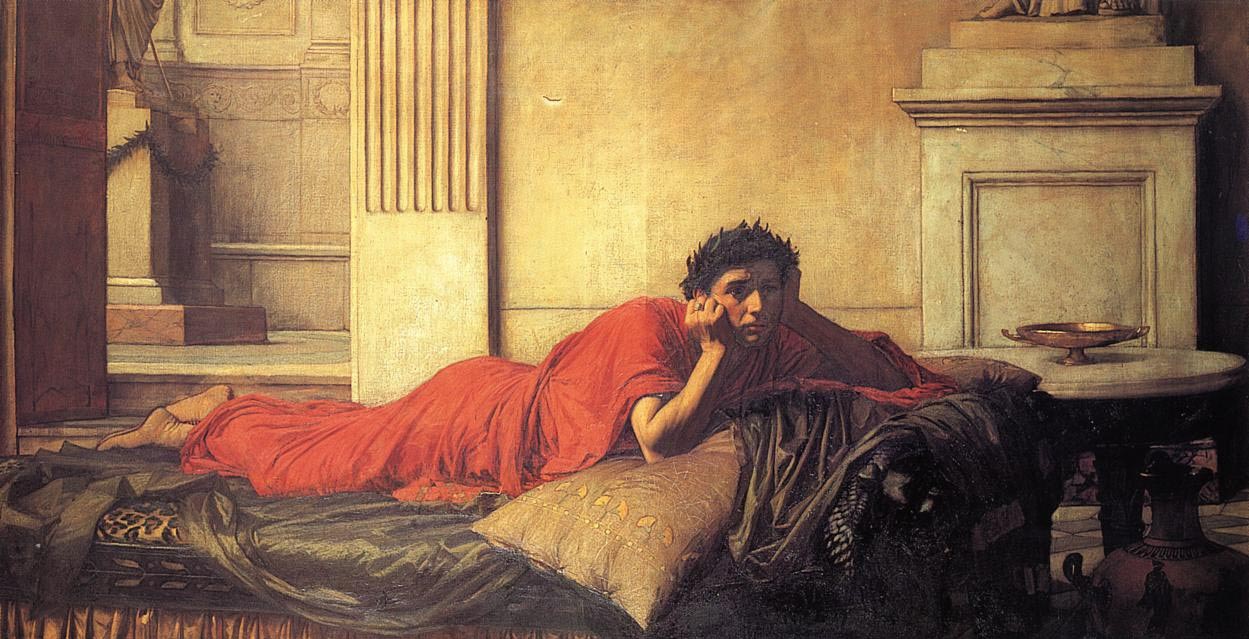
Waterhouse, The Remorse of Nero after the Murder of his Mother (1878)
- murders of relatives & others close to Nero turning point(s): Claudius (?), stepbrother Britannicus, Agrippina (59 CE), aunt, wives, stepson; Seneca (Pisonian conspiracy, 65 CE) & Burrus (?) + other rivals
- rebellion & death in 68 CE: Vindex, governor in Gaul & Galba, governor in Spain + Praetorian Guard; senate declares Nero "public enemy"; popular resentment (". . . it became widely known that at a time of general food shortage, a ship from Alexandria had brought a cargo of sand for the court wrestlers", 45), Nero Redivivus ("reborn") legend persists for centuries
- suicide: qualis artifex pereo, "What an artist dies in me"; civil wars = Year of the Four Emperors (Galba, Otho, Vitellius, Vespasian 69 CE > Flavian Dynasty)
Nero: the man behind the myth (2021 British Museum exhibit)
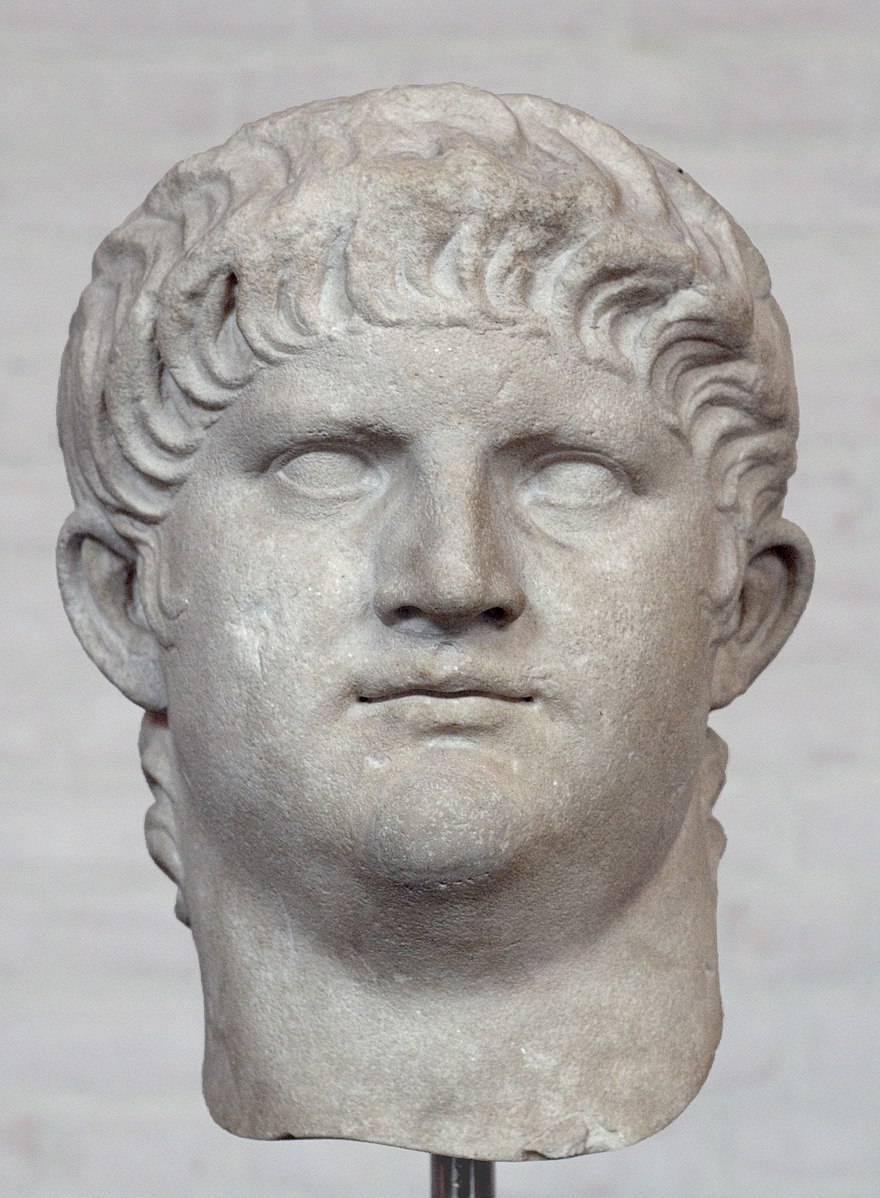
Nero's Theatricality & Social Performances (forcing others to play along)
Suetonius, Nero 22
Soon he himself wanted to drive a chariot and even to do so frequently in front of an audience; once he had made his beginning in his own gardens watched by slaves and poor common people, he offered himself as a spectacle to the entire populace in the Circus Maximus, with some freedman giving the starting signal usually provided by magistrates.
Suetonius, Nero 23
When he was singing, it was not permitted to leave the theatre, even for the most pressing of reasons. Thus, it is alleged that women gave birth during his shows and many who were tired of listening and applauding, when the entrance gates were all closed, either jumped furtively off the wall or else pretended to be dead and were carried off for burial. You could scarcely believe how nervous and anxious he was in competitions, or how he competed against his rivals, or how he feared the judges' verdict. He would pay attention to his competitors and seek their favour, as if they were equals, then cast aspersions on them behind their backs. Some he would insult to their faces. He would even bribe those who were especially talented. Nevertheless, he would address the judges most reverently before he began, assuring them that he had done all that he could but the outcome would be determined by Fate.
Suetonius, Nero 24-25
And once when he was performing a tragedy and he dropped his sceptre, and picked it up again, he was fearful and anxious that he might be disqualified for this fault and could only be reassured by the accompanist's assurance that no one had noticed it amid the rapturous cheers of the audience [cf. trained claques, 20] . . . He also entered the chariot races on many occasions, even driving a ten-horse team at Olympia [67 CE] . . . However, he fell from the chariot and although he resumed his post he was unable to finish, abandoning the race before the end. He received the victory crown, nonetheless. Then, on his departure, he bestowed freedom on the entire province, at the same time giving the judges Roman citizenship and substantial sums of money.
autocracy & sports: cf. Kim Jong-Il's score of 34 (-38) on Pyongyang Golf Course (7,700-yards, 1994); Jesse Owens & Hitler's 1936 Berlin Olympics
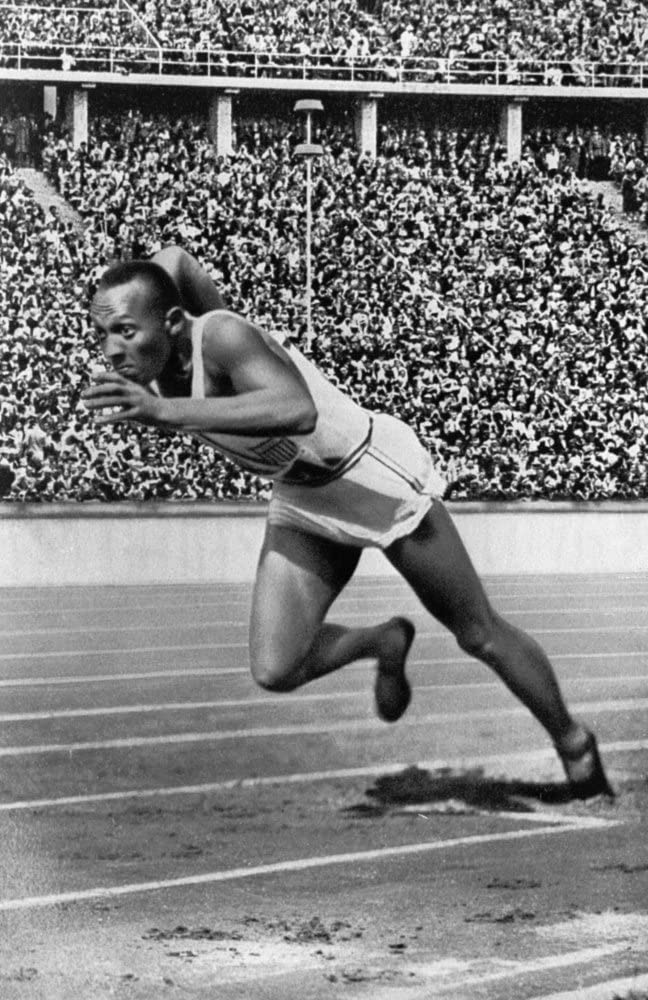
Leni Riefenstahl's documentary Olympia: Festival of Nations (1938): https://www.youtube.com/watch?v=H3LOPhRq3Es
Jesse Owens's 1936 100m win: https://www.youtube.com/watch?v=Ko1-di-kaKQ
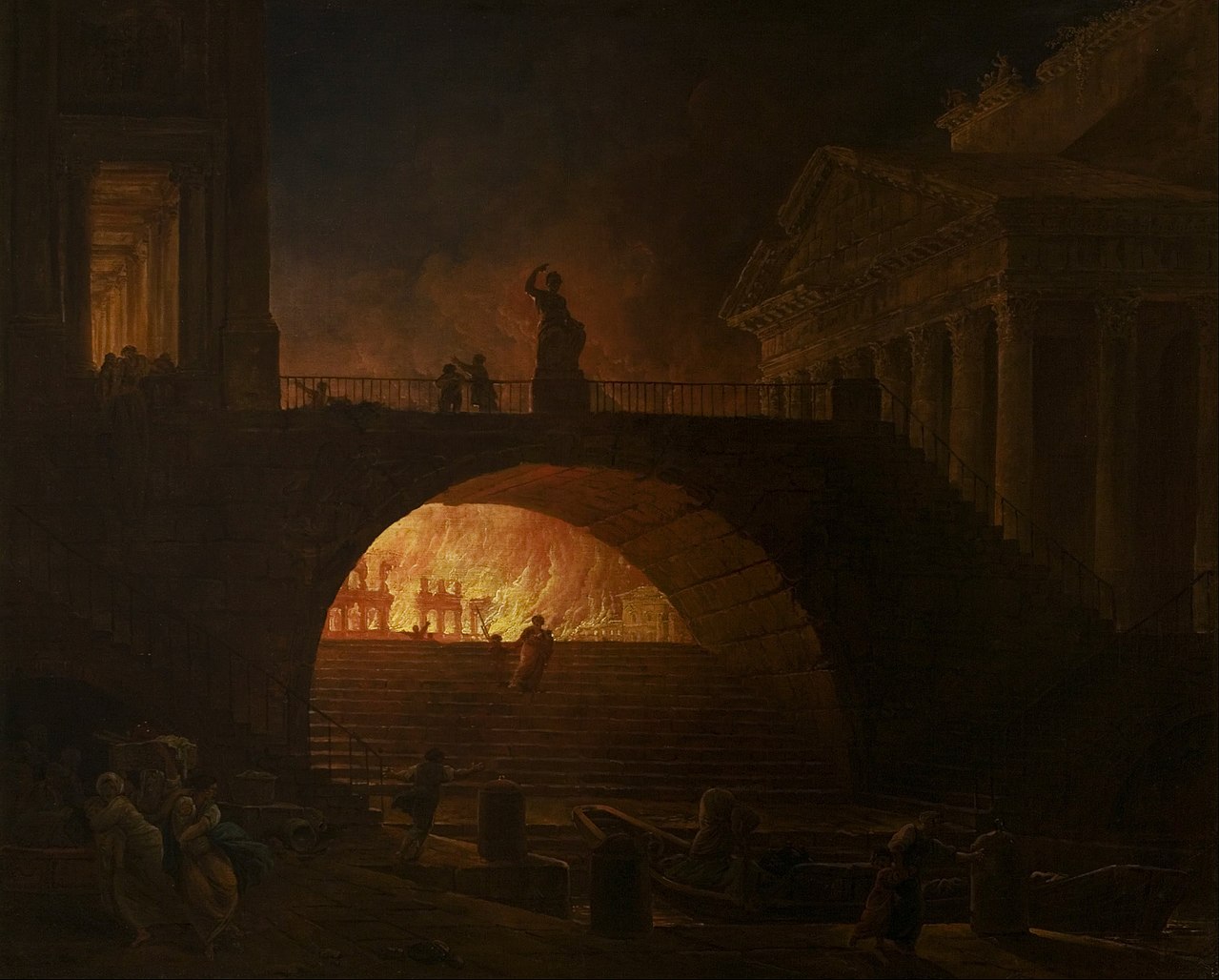
Hubert, The Fire of Rome (1785)
- Nero & the Great Fire of 64 CE (fuller account in Tacitus, Annals 15.38-44, ca. 115 CE)
National Geographic's "Rome in Flames" (2013)
Suetonius, Nero 38 (cultural catastrophe & the obliteration of civic memory/tradition; Neropolis?)
For, as if he were upset by the ugliness of the old buildings and the narrow and twisting streets, he set fire to the city, so openly indeed that some ex-consuls, when they came upon his servants equipped with kindling and torches on their property, did not stop them. He greatly desired some land near the Golden House, then occupied by granaries, and had them torn down and burnt using military machinery because their walls were made of stone. For six days and seven nights destruction raged and the people were forced to take shelter in monuments and tombs. During that time, besides the enormous number of apartment blocks, the houses of great generals of old, together with the spoils of battle which still adorned them, the temples of the gods, too, which had been vowed and dedicated by Rome's kings and later in the Punic and Gallic wars, and every other interesting or memorable survival from the olden days went up in flames. Nero watched the fire from the tower of Maecenas, delighted with what he termed 'the beauty of the flames' and, dressed in his stage attire, he sang 'The Fall of Troy'.
Peter Ustinov as Nero in Quo Vadis (1951): https://www.youtube.com/watch?v=_EVZwTMmk8c
- Nero's scapegoating of Christians: "Punishments were imposed on the Christians—adherents of a new and dangerous superstition" (16)
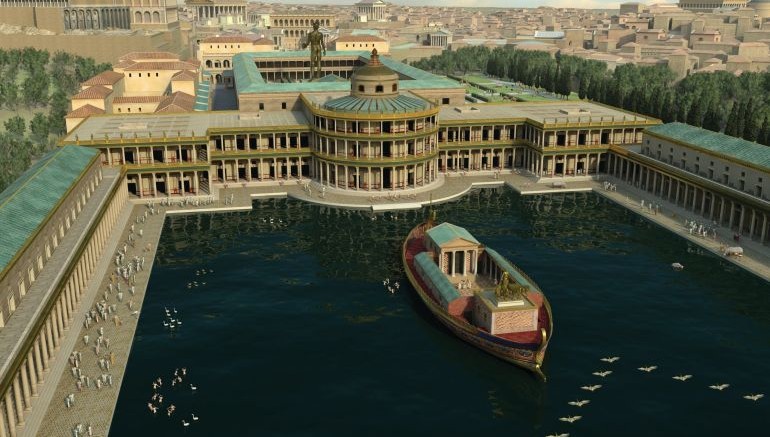
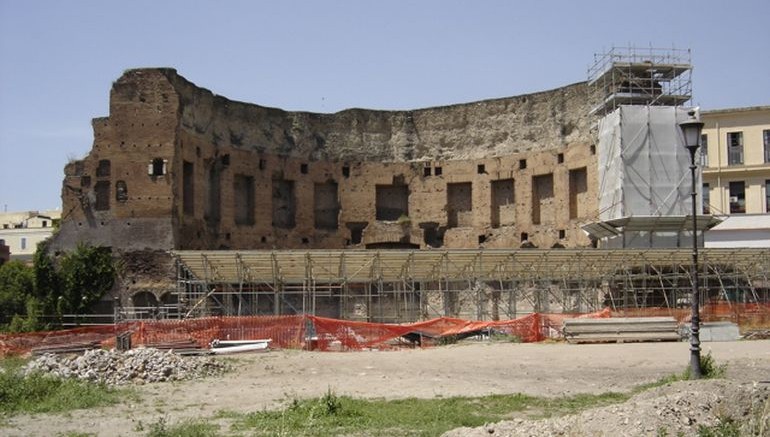
Reconstruction of Nero's Golden House and Excavations today
Tacitus, Annals 15.44
Therefore, to scotch the rumour that he ordered the fire, Nero substituted as culprits, and punished with the utmost refinements of cruelty, a class of men, loathed for their vices, whom the crowd styled Christians. Christus, the founder of the name, had undergone the death penalty in the reign of Tiberius, by sentence of the governor Pontius Pilatus, and the pernicious superstition was checked for a moment, only to break out once more, not merely in Judaea, the home of the disease, but in the capital itself, where all things horrible or shameful in the world collect and find a vogue. First, then, the confessed members of the sect were arrested; next, on their disclosures, vast numbers were convicted, not so much on the count of arson as for hatred of the human race. And derision accompanied their end: they were covered with wild beasts' skins and torn to death by dogs; or they were fastened on crosses, and, when daylight failed were burned to serve as lamps by night. Nero had offered his Gardens for the spectacle, and gave an exhibition in his Circus, mixing with the crowd in the habit of a charioteer, or mounted on his car. Hence, in spite of a guilt which had earned the most exemplary punishment, there arose a sentiment of pity, due to the impression that they were being sacrificed not for the welfare of the state but to the ferocity of a single man.
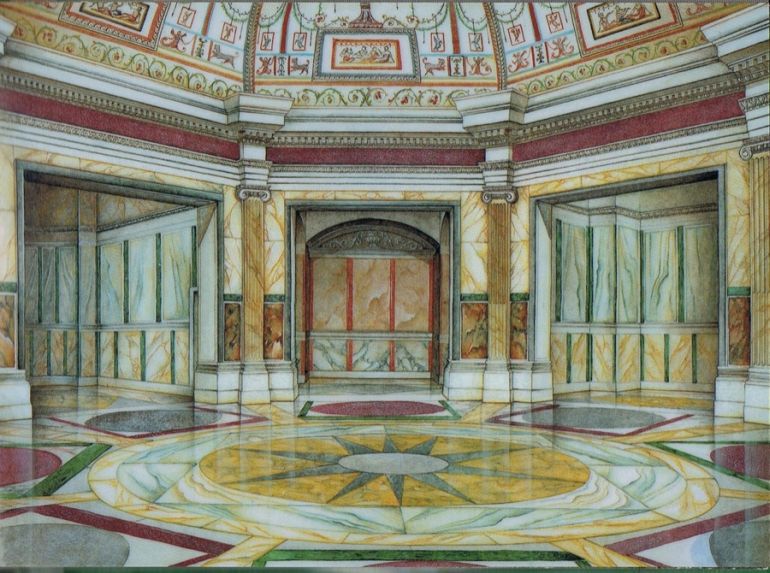
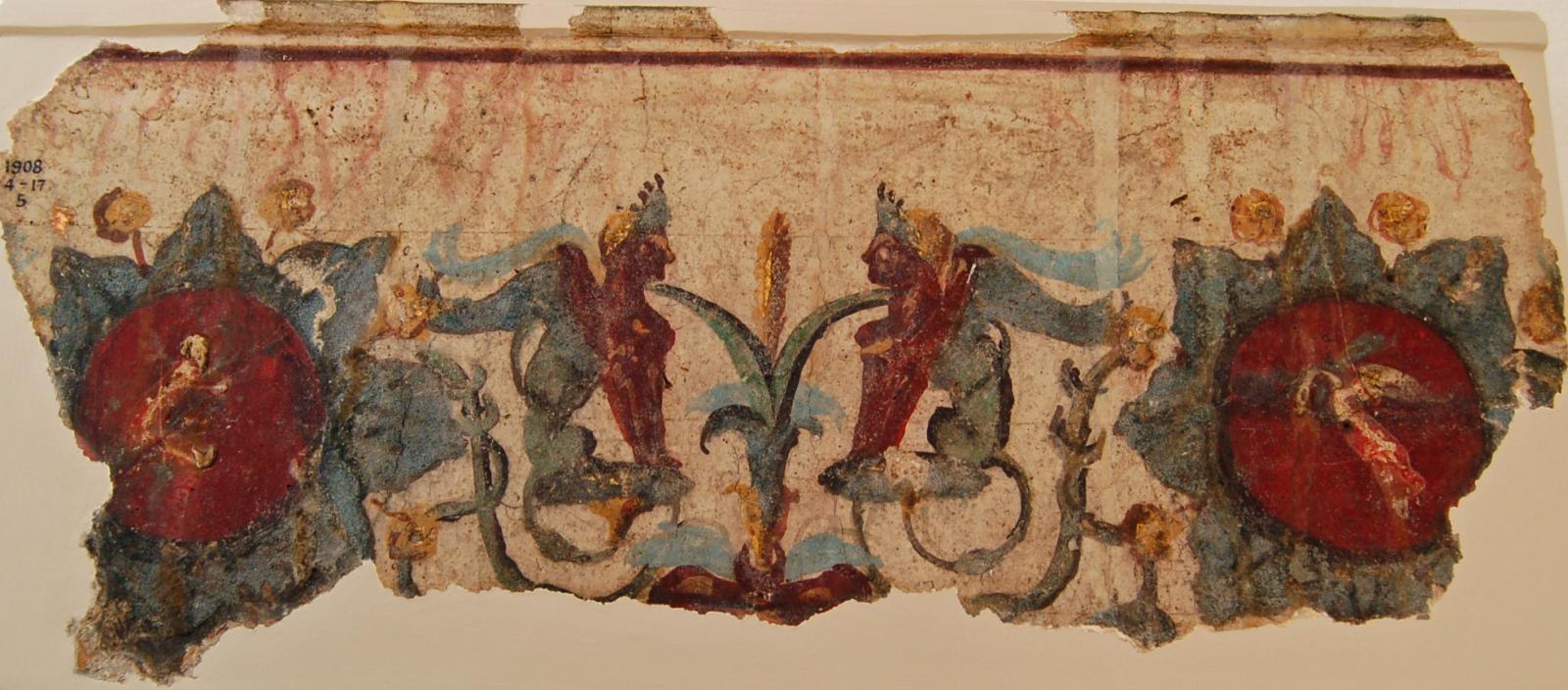
L: Reconstruction of room in Nero's Golden House; R: fragment of wall painting from Domus Aurea
- Nero's megalomaniac Domus Aurea ("Golden House"): control of city & public space & controlling the world
Suetonius, Nero 31
There was a vestibule area in which stood a colossal statue, one hundred and twenty feet tall, in the image of the emperor himself. So great was its extent that its triple colonnade was a mile in length. There was also a lake, which resembled the sea, surrounded by buildings made to look like cities. Besides this, there were grounds of all kinds, with fields and vineyards, pasture and woodland, and a multitude of all sorts of domestic and wild animals. Other areas were all covered in gold and picked out with jewels and mother-of-pearl. The banqueting hall had coffered ceilings fitted with panels of ivory which would revolve, scattering flowers, and pipes which would spray perfume on those beneath. The principal banqueting chamber had a dome which revolved continuously both day and night, like the world itself.
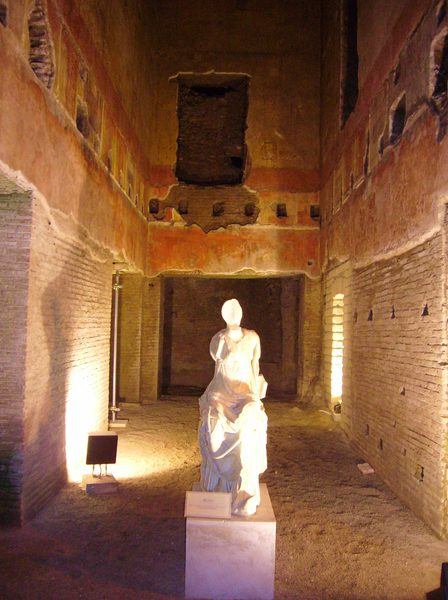
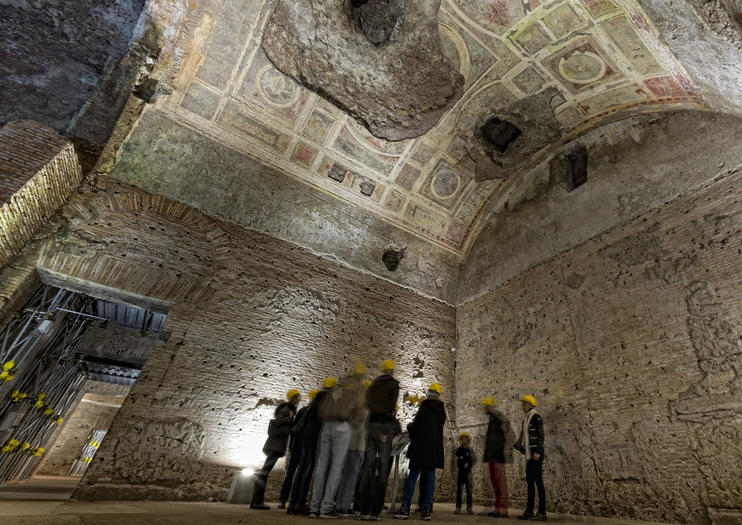
Excavations in West Wing of Nero's Golden House
- Colosseum/Flavian Amphitheater (built 72-80 CE, Vespasian > Titus): reclaiming public space from Nero
